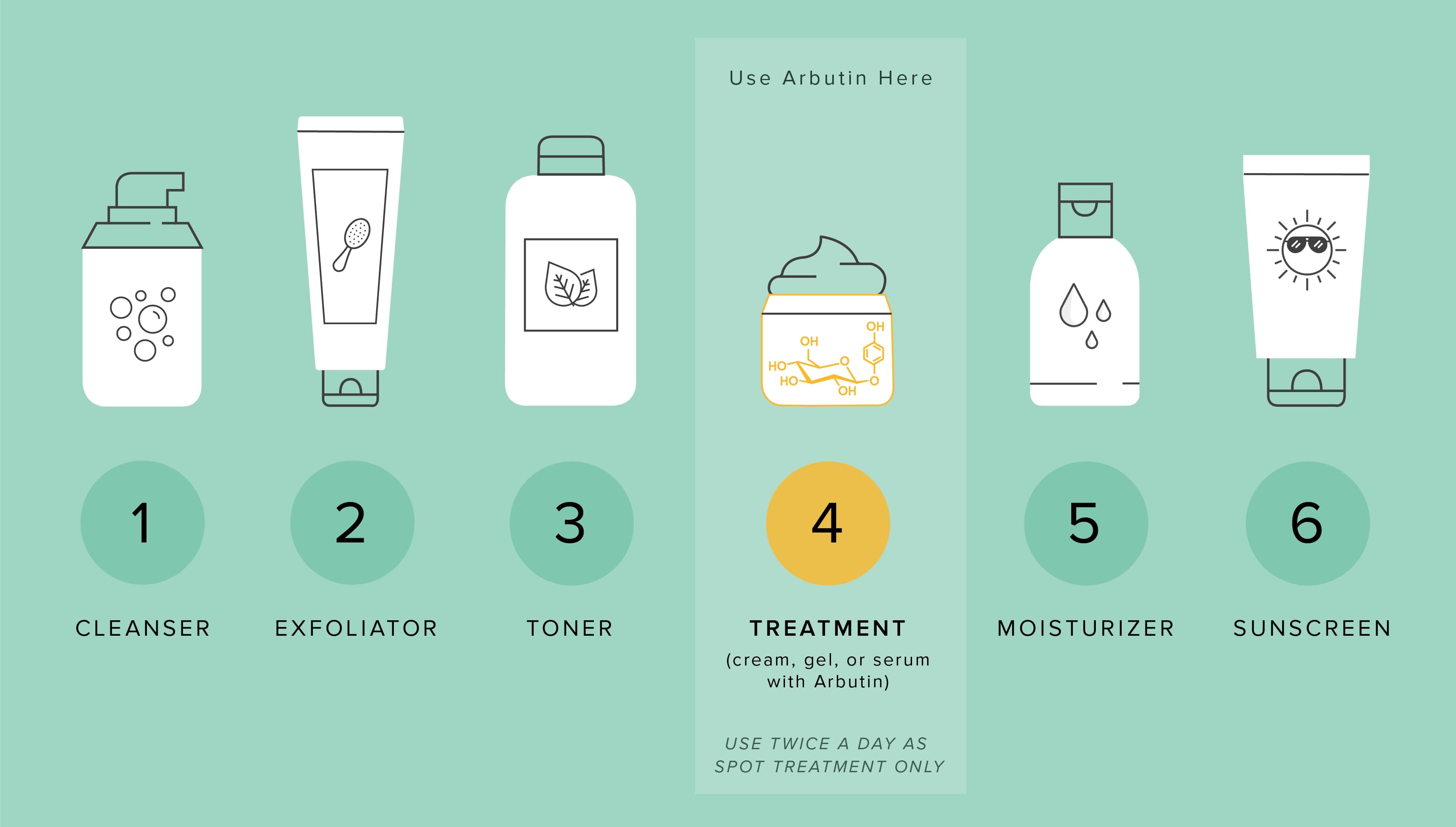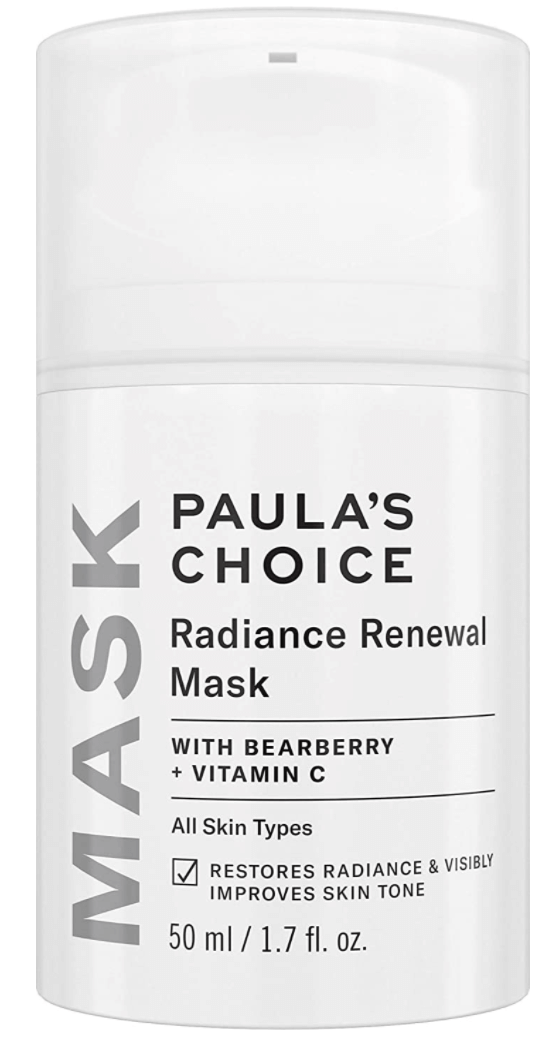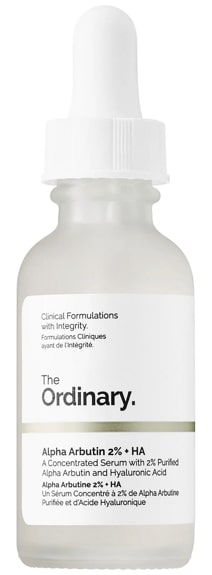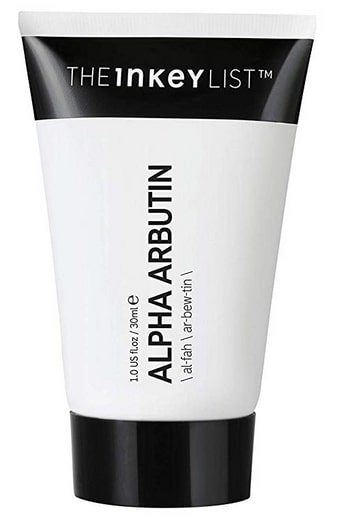Arbutin Skin Care Benefits:
All You Need to Know
Arbutin is derived from the leaves of fruits such as bearberry (uva-ursi), pear and cranberry, and it is sometimes made synthetically. Arbutin is used by dermatologists as a topical skin lightening agent for treating hyperpigmentation. It is categorized as a plant extract and tyrosinase inhibitor (a fancy word for a skin lightening agent).
Arbutin
INGREDIENT CATEGORY: Plant Extract, Tyrosinase Inhibitor
BEST FOR TREATING: Hyperpigmentation (Dark Spots), Brightening
SKIN TYPES FOR USE: All
SAFETY: A-Arbutin is safe for topical use in concentrations of up to 2% and B-Arbutin is safe for topical use in concentrations of up to 7% in skin care products. Do not use longer than 3 months at a time.
GHS TIP: It will take 1-2 months of consistent topical use of arbutin before you begin to see improvements
Top 3 Arbutin Skin Care Benefits
✓ Natural Skin Lightening Agent
TREATS HYPERPIGMENTATION
Arbutin is a cosmeceutical that fades hyperpigmentation meaning it works to fade sun spots, age spots, acne scars, and melasma. Plus, arbutin prevents future freckles and hyperpigmentation from developing, even after a sunburn.
How? Arbutin stops any extra production of melanin (the pigment that creates skin color). Melanin is produced when an enzyme called tyrosinase makes the amino acid tyrosine, and then the tyrosine gets passed off to cells called melanocytes that convert the tyrosine into melanin. Arbutin disrupts this chain of events by telling tyrosinase to pause on the tyrosine production - without tyrosine, melanocytes have nothing to work with which limits the melanin production in your skin. So there you have it: less tyrosine and less melanin means less pigment, less dark spots, and a more even complexion. Splendid.
✓ Brightens Complexion
GET THE JLO GLOW
Arbutin evens and brightens your complexion making your skin look healthier and vibrant. Think of it like the skin care beauty blender - instead of blending out with foundation, arbutin is literally blending out your actual skin. Arbutin reveals your inner beaming, beautiful angel face, and we’re so down with that.
✓ Less Aggressive than Hydroquinone
SAFE & STILL POWERFUL
For more severe hyperpigmentation and melasma, hydroquinone has traditionally been the ingredient of choice due to it's strength, but the hydroquinone often used in skin care products is synthetic, aggressive, and can badly damage the skin if used incorrectly (like permanently damage the skin with blueish/greyish splotches). Arbutin is a much safer, more natural derivative of hydroquinone, and topical treatment of arbutin has been shown to treat melasma as well as severe dark areas. All the power without the bad side effects.
When to Use Arbutin
SKIN CARE ROUTINE OPTION:
A serum, cream, or gel with arbutin - use 2x a day

How to Apply Arbutin
Work up to it
Always do a patch test! Start by applying the arbutin product in the evening to a small area on your forehead (where your facial skin is thickest). If there’s no irritation within 24hrs, begin applying the product as spot treatment to your skin every night. If there’s no irritation after a week and you want to get more aggressive with the treatment, begin applying the arbutin product both morning and night.

Apply to entire face or as spot treatment
You can apply arbutin directly to the areas on your face affected by hyperpigmentation as spot treatment, or you can apply your arbutin product to your entire face (avoid eyes, lips, and mouth). Besides your face, your chest and hands are other areas that hyperpigmentation can affect as well. Therefore, you can also apply arbutin to the tops of your hands and chest.

Follow Up With...
Don’t forget to hydrate your skin twice a day with a moisturizer! Let your arbutin cream or serum fully dry before applying your moisturizer. If you apply moisturizer right away, the arbutin will not have a chance to sink into your skin enough to work it’s magic.
Arbutin can make your skin more susceptible to sunburn and more sensitive to UV rays. Melanin helps protect your skin from sunburn, and since arbutin limits melanin production, it leaves your skin more vulnerable to sunburn. Plus, if you’re trying to lighten hyperpigmentation, not wearing sunscreen can cause age spots and sun spots, and we know you don’t want that. Limit your time in the sun and apply sunscreen daily.
Arbutin in Products


Brightening
Hyperpigmentation


All Skin Types!


Cleansers
Creams/Gels
Serums
Masks


Over the Counter
Prescribed Medication
Top 3 Arbutin Skin Care Products
We’ve put together a GHS curated selection of our favorite skin care products that contain arbutin for skin brightening and treating hyperpigmentation. We only link to products that we absolutely believe in. All the products we’ve chosen are paraben-free, sulfate-free, and phthalate-free. Remember - results won’t happen overnight. It will take 1-2 months of consistent topical use before you begin to see improvements, so stay consistent with your product usage.
Use in AM & PM
Apply a few drops of this serum to discolored areas post cleansing, exfoliating, toning, and any vitamin C serum. Do not use this product within 24 hours of using a retinol formula.
Price $
Certified: paraben-free, sulfate-free, phthalate-free, cruelty-free, vegan, gluten-free
Use in AM & PM
Apply a few drops of this serum to discolored areas post cleansing, exfoliating, toning, and any vitamin C serum. Do not use this product within 24 hours of using a retinol formula.
Price $
Certified: paraben-free, sulfate-free, phthalate-free, cruelty-free, vegan
Use 2-3x weekly in PM
Apply this mask 2-3x weekly in the evenings post cleansing, exfoliating, toning, and serums. Leave on overnight. Do not use this product within 24 hours of using a retinol formula.
Price $$
Certified: paraben-free, sulfate-free, phthalate-free, cruelty-free
Check out all of our favorite arbutin products for fading dark spots.
GHS Tips
Consistency is key
Results won’t happen overnight. Consistency is key. It will take 1-2 months of consistent topical use before you begin to see improvements. Be patient - good things come to those who wait.

Safety Tips
This is a very controversial ingredient due to the fact that it is a form of hydroquinone. However, A-Arbutin is safe for topical use in concentrations of up to 2% in skin care products, and B-Arbutin is safe for topical use in concentrations of up to 7% in skin care products.
SIDE EFFECTS OF ARBUTIN SKIN PRODUCTS:
- redness or irritation from an allergic reaction
✓ Wear sunscreen!
✓ Consider consulting a dermatologist - let them determine the right arbutin concentration for you
X Don't use more than 3 months at a time - you'll damage your skin. Think of it like this: you don't juice cleanse 100% of the year because obviously that would be damaging to your body
X Don't use arbutin on damaged or broken skin
FAQs about Arbutin
Q. What is arbutin?
Arbutin is derived from the leaves of fruits such as bearberry (uva-ursi), pear and cranberry, and it is sometimes made synthetically.
 Q. What is arbutin used for in skin care?
Q. What is arbutin used for in skin care?Arbutin is used to treat the following skin concerns:
- Hyperpigmentation (Dark Spots)
- Brightening
 Q. How does arbutin benefit my skin?
Q. How does arbutin benefit my skin?The top 4 arbutin skin benefits are:
- A natural skin lightening agent - inhibits the production of melanin in the skin
- Fades hyperpigmentation
- Brightens your overall complexion
- Less aggressive than hydroquinone
 Q. What skin types is arbutin good for?
Q. What skin types is arbutin good for?Arbutin is safe to use on all skin types.
 Q. Is arbutin safe for my skin?
Q. Is arbutin safe for my skin?This is a very controversial ingredient due to the fact that it is a form of hydroquinone. However, A-Arbutin is safe for topical use in concentrations of up to 2% in skin care products, and B-Arbutin is safe for topical use in concentrations of up to 7% in skin care products.
 Q. Is arbutin safe for dark skin?
Q. Is arbutin safe for dark skin?Yes, arbutin is safe for both dark skin and light skin - it has been formulated for all skin tones. Arbutin cannot change the color of your naturally dark skin, it can only lighten non-normal pigmentation caused from freckles, age spots, sun spots, acne scars, or melasma. Keep in mind that darker skin types have more natural melanin, so it may take longer to see results.
 Q. What are common side effects from applying arbutin topically?
Q. What are common side effects from applying arbutin topically?Redness or irritation from an allergic reaction can be common side effects from applying arbutin topically. Always be sure to do a patch test on your skin before applying a new product to your entire face.
 Q. How long does arbutin take to work topically?
Q. How long does arbutin take to work topically?It will take 1-2 months of consistent topical use of arbutin before you begin to see improvements. Remember - consistency is key for optimal results. Results will not happen overnight.
 Q. Is arbutin safe to use everyday?
Q. Is arbutin safe to use everyday?Yes, arbutin is safe to use everyday. Depending on your skin's sensitivity, it can be used twice a day. Just remember, don't use arbutin more than 3 months at a time because that can be damaging to your skin.
 Q. Can arbutin permanently lighten skin or bleach skin?
Q. Can arbutin permanently lighten skin or bleach skin? No. Arbutin does not have the ability to permanently bleach or lighten your skin. Although arbutin can lighten and brighten your skin, it is not destroying melanin - it simply disrupts/slows melanin production. So if you use arbutin and feel like your skin is becoming too light, you can hit the ‘undo’ button by stopping arbutin application and the melanin production in your skin will speed up again. The lightened skin and brightness achieved from arbutin products will not immediately reverse as soon as you stop using arbutin skincare, instead it will take many months to return to its previous state. You can, however, completely destroy melanin with other ingredients like hydroxybenzoquinone. We do not recommend hydroxybenzoquinone for your skin because it can be damaging to your skin.
 Q. What is the difference between alpha-Arbutin (α-Arbutin) and beta-Arbutin (β-Arbutin)?
Q. What is the difference between alpha-Arbutin (α-Arbutin) and beta-Arbutin (β-Arbutin)?Both alpha-Arbutin (α-Arbutin) and beta-Arbutin (β-Arbutin) suppresses melanin production that causes freckles and suntan. However, studies have shown that alpha-Arbutin (α-Arbutin) is estimated to be more than ten times stronger than that of beta-Arbutin (β-Arbutin).
 Q. What is the difference between arbutin and hydroquinone?
Q. What is the difference between arbutin and hydroquinone?Arbutin is a natural derivative of hydroquinone, and although it works through a similar mechanism as hydroquinone, it is not as aggressive. Arbutin does not possess the same risks and serious side effects as hydroquinone, and as a result, hydroquinone requires a prescription. If hydroquinone is used incorrectly for an extended period of time, it can permanently damage your skin, leaving blueish/grey splotches.
 Q. How does arbutin compare to kojic acid?
Q. How does arbutin compare to kojic acid?Arbutin and kojic acid are natural lightening ingredients that reduce melanin production and both are available over the counter. The main difference between arbutin and kojic acid is that kojic acid is more prone to oxidize (to react with oxygen) meaning it’s more sensitive to air, heat, and light. We care because when kojic acid oxidizes, the chemical makeup of the ingredient changes and becomes less effective as a skin care ingredient. To preserve the potency and effectiveness of kojic acid, make sure you store in a cool, dark area. All in all, arbutin and kojic acid are both great choices for lightening darker patches of skin, but arbutin is a bit easier to store.
 Q. Can I use arbutin with alpha hydroxy acids (AHAs)?
Q. Can I use arbutin with alpha hydroxy acids (AHAs)?Yes! Pairing arbutin with alpha hydroxy acids (AHAs) such as glycolic or lactic acid can lead to faster results.
 Q. How long should someone use a product containing arbutin?
Q. How long should someone use a product containing arbutin?Use in 3 month bursts to target hyperpigmentation. Do not use this bad boy all day, every day, for longer than 3 months at a time. Think of it like a juice cleanse or a marathon--good sometimes but never the status quo.
 Q. Do arbutin skin care products expire?
Q. Do arbutin skin care products expire?Yes. Look for the expiration date or a POA (prescribed period after opening) which tells you how long the product is good after it’s been opened. If your arbutin product has expired, do not use it - expired products can cause skin irritation, bacterial infection, or breakouts.
 Q. What are common names used to identify arbutin on an ingredient list for skin care products?
Q. What are common names used to identify arbutin on an ingredient list for skin care products?- Arbutin
- Alpha-Arbutin (α-Arbutin)
- Beta-Arbutin (β-Arbutin)

Want More GHS Tips?
It’ll be the best thing to ever slide into your DM's.


